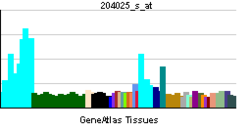- PDCD2
-
Programmed cell death 2 Identifiers Symbols PDCD2; MGC12347; RP8; ZMYND7 External IDs OMIM: 600866 MGI: 104643 HomoloGene: 1951 GeneCards: PDCD2 Gene Gene Ontology Molecular function • DNA binding
• protein binding
• zinc ion binding
• metal ion bindingCellular component • nucleus
• cytoplasmBiological process • apoptosis Sources: Amigo / QuickGO RNA expression pattern 
More reference expression data Orthologs Species Human Mouse Entrez 5134 18567 Ensembl ENSG00000071994 ENSMUSG00000014771 UniProt Q16342 Q6RI66 RefSeq (mRNA) NM_001199461.1 NM_008799.2 RefSeq (protein) NP_001186390.1 NP_032825.2 Location (UCSC) Chr 6:
170.88 – 170.89 MbChr 17:
15.66 – 15.66 MbPubMed search [1] [2] Programmed cell death protein 2 is a protein that in humans is encoded by the PDCD2 gene.[1][2]
This gene encodes a nuclear protein expressed in a variety of tissues. The rat homolog, Rp8, is transiently expressed in immature thymocytes and is thought to be involved in programmed cell death. Expression of the human gene has been shown to be repressed by BCL6, a transcriptional repressor required for lymph node germinal center development, suggesting that BCL6 regulates apoptosis by its effects on PDCD2. This gene is closely linked on chromosome 6 to the gene for TBP, the TATA binding protein. Six transcripts encoding different proteins have been identified.[2]
Interactions
PDCD2 has been shown to interact with Host cell factor C1[3] and Parkin (ligase).[4]
References
- ^ Kawakami T, Furukawa Y, Sudo K, Saito H, Takami S, Takahashi E, Nakamura Y (Aug 1995). "Isolation and mapping of a human gene (PDCD2) that is highly homologous to Rp8, a rat gene associated with programmed cell death". Cytogenet Cell Genet 71 (1): 41–3. doi:10.1159/000134058. PMID 7606924.
- ^ a b "Entrez Gene: PDCD2 programmed cell death 2". http://www.ncbi.nlm.nih.gov/sites/entrez?Db=gene&Cmd=ShowDetailView&TermToSearch=5134.
- ^ Scarr, Rebecca B; Sharp Phillip A (Aug. 2002). "PDCD2 is a negative regulator of HCF-1 (C1)". Oncogene (England) 21 (34): 5245–54. doi:10.1038/sj.onc.1205647. ISSN 0950-9232. PMID 12149646.
- ^ Fukae, Jiro; Sato Shigeto, Shiba Kahori, Sato Ken-ichi, Mori Hideo, Sharp Philip A, Mizuno Yoshikuni, Hattori Nobutaka (Feb. 2009). "Programmed cell death-2 isoform1 is ubiquitinated by parkin and increased in the substantia nigra of patients with autosomal recessive Parkinson's disease". FEBS Lett. (Netherlands) 583 (3): 521–5. doi:10.1016/j.febslet.2008.12.055. PMID 19146857.
Further reading
- Baron BW, Anastasi J, Thirman MJ et al. (2002). "The human programmed cell death-2 (PDCD2) gene is a target of BCL6 repression: Implications for a role of BCL6 in the down-regulation of apoptosis". Proc. Natl. Acad. Sci. U.S.A. 99 (5): 2860–5. doi:10.1073/pnas.042702599. PMC 122438. PMID 11854457. http://www.pubmedcentral.nih.gov/articlerender.fcgi?tool=pmcentrez&artid=122438.
- Scarr RB, Sharp PA (2002). "PDCD2 is a negative regulator of HCF-1 (C1)". Oncogene 21 (34): 5245–54. doi:10.1038/sj.onc.1205647. PMID 12149646.
- Strausberg RL, Feingold EA, Grouse LH et al. (2003). "Generation and initial analysis of more than 15,000 full-length human and mouse cDNA sequences". Proc. Natl. Acad. Sci. U.S.A. 99 (26): 16899–903. doi:10.1073/pnas.242603899. PMC 139241. PMID 12477932. http://www.pubmedcentral.nih.gov/articlerender.fcgi?tool=pmcentrez&artid=139241.
- Mungall AJ, Palmer SA, Sims SK et al. (2003). "The DNA sequence and analysis of human chromosome 6". Nature 425 (6960): 805–11. doi:10.1038/nature02055. PMID 14574404.
- Ota T, Suzuki Y, Nishikawa T et al. (2004). "Complete sequencing and characterization of 21,243 full-length human cDNAs". Nat. Genet. 36 (1): 40–5. doi:10.1038/ng1285. PMID 14702039.
- Bouwmeester T, Bauch A, Ruffner H et al. (2004). "A physical and functional map of the human TNF-alpha/NF-kappa B signal transduction pathway". Nat. Cell Biol. 6 (2): 97–105. doi:10.1038/ncb1086. PMID 14743216.
- Lehner B, Sanderson CM (2004). "A Protein Interaction Framework for Human mRNA Degradation". Genome Res. 14 (7): 1315–23. doi:10.1101/gr.2122004. PMC 442147. PMID 15231747. http://www.pubmedcentral.nih.gov/articlerender.fcgi?tool=pmcentrez&artid=442147.
- Gerhard DS, Wagner L, Feingold EA et al. (2004). "The Status, Quality, and Expansion of the NIH Full-Length cDNA Project: The Mammalian Gene Collection (MGC)". Genome Res. 14 (10B): 2121–7. doi:10.1101/gr.2596504. PMC 528928. PMID 15489334. http://www.pubmedcentral.nih.gov/articlerender.fcgi?tool=pmcentrez&artid=528928.
- Chen Q, Qian K, Yan C (2006). "Cloning of cDNAs with PDCD2(C) domain and their expressions during apoptosis of HEK293T cells". Mol. Cell. Biochem. 280 (1–2): 185–91. doi:10.1007/s11010-005-8910-z. PMID 16311922.
- Baron BW, Zeleznik-Le N, Baron MJ et al. (2007). "Repression of the PDCD2 gene by BCL6 and the implications for the pathogenesis of human B and T cell lymphomas". Proc. Natl. Acad. Sci. U.S.A. 104 (18): 7449–54. doi:10.1073/pnas.0701770104. PMC 1863460. PMID 17468402. http://www.pubmedcentral.nih.gov/articlerender.fcgi?tool=pmcentrez&artid=1863460.
Categories:- Human proteins
- Chromosome 6 gene stubs
Wikimedia Foundation. 2010.
